A collection of thoughts, works, projects, and other things.
Don't wanna be here? Send us removal request.
Text
The 2018 Reading List
Here’s the 2nd annual reading list (and probably the final post for Tumblr since the platform is dying)
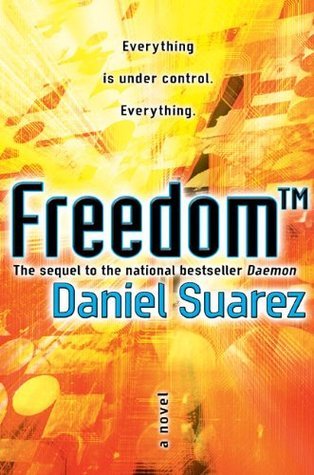
Freedom ™ - Daniel Suarez
- Finished February 18th
This is the 2nd book in the Daemon saga. It picks up about 4 months after the close of the first book and does its best to tie the first story into a much larger epic. While an enjoyable book, the focus is much more on the characters introduced in the first book and much less on the Daemon itself. This was an interesting read, because two of the main characters from the first book really don’t have much to do and are just part of the larger story. There’s also some interesting comparisons I could make between this book’s overall message and that of Atlas Shrugged. One of the most annoying parts of Atlas Shrugged is how Rand beats the reader over the head about how great her viewpoint is and how absurd normalcy is. Suarez does this too in his own way when he describes these ‘holons’ or communities of Daemon operatives. It’s a strange tale, one that also ends with a fizzle instead of a bang. I don’t want to be too hard on this book, it just seems the author had a lot more direction and gusto to the climax of the first book and not as much in the second.
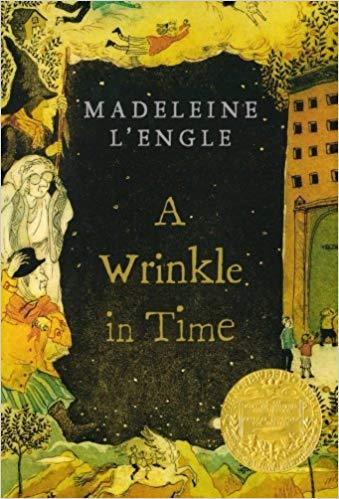
A Wrinkle In Time - Madeleine L’Engle
- Finished March 3rd
I originally read this book when I was in the 6th grade. While I remembered a good deal about it, there were definitely blank spots in my memory on how the kids and witches travelled around the universe. Re-reading this 27 years later was very interesting. Originally I hadn’t realized how religious this book had been. I suppose going to school in Kennesaw, GA probably didn’t help since religion was awash pretty much everywhere. The story follows the Murry family whose father has been missing for some time. The main character is the oldest child, their daughter Meg. With the help of 2 and a half women, Meg, her little brother, and a friend must travel throughout the galaxy to attempt to save their father from IT - a telepathic giant brain who can control entire planets. It’s interesting how this book, which was written in the early 1960s, is a product of its time. The principle battle is with a very thinly veiled communism. Everyone on dark planets are living identical lives and performing everything in the exact perfect rhythm. IT uses the ability to control people to have them conform. Also ‘The Black Thing’ which is essentially a giant shadow is a direct representation of the devil, while the light is God. Jesus and God are also mentioned by name in the book, just to ensure that the points are driven home. The ‘witches’ were originally stars and are billions of years old, and attempt to pretend to be humans when meeting the children. They disguise themselves as witches and live in a haunted house because that seemed the easiest way to hide in plain sight. It’s an interesting tale with very familiar tropes including the fact that love quite literally saves the day. I also didn’t recall this being a ‘Quintet’ of stories, as apparently the adventures continue. From what I hear they get even more biblical and time travel allows them to visit Noah’s Ark for some reason. I’ll save this copy for my daughters when they get a little older, as it’s a great children’s book… but doesn’t quite hold up for the adult reader.
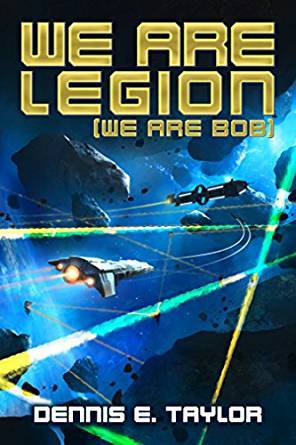
We are Legion (We are Bob) - Dennis Taylor
- Finished March 13th
This book follows the fate of Bob, an engineer who sells his software company and immediately signs up to have his head cryo-frozen when he dies. Almost immediately he is hit by a car and wakes up as a computer program ~100 years in the future. He has been awoken to be trained to be a Von Neuenburg probe and replicate himself throughout the galaxy. I immediately loved this book. The first third deals with Bob coming to grips with being a computer simulation as well as learning all the tools and techniques he’ll need for his voyage. As an engineer myself, it was great reading about all the subroutines he would write to support his tasks as well as the semi-detective work he would do to try and learn more about his situation. After he is launched into space things go sideways and he has to fend off the geo-political terrorist attacks against him and his project. The 2nd third of the book deals with Bob replicating himself, getting along with the clones, and the troubles with the Brazilian forces that are trying to destroy him. The book starts to fizzle out here, and by the end of the book I started to realize that this was going to be the first book in a trilogy. The last third of the book has a plot-line involving Bob Prime taking a vast interest in a life-form of Furry Bat-like people that Bob basically becomes a God to. He attempts to defend them from these gorilla like animals that keep murdering them. I found this part of the story tedious and began rooting for the bat people to all be murdered. In any case this was a fun book at the beginning but it really took a turn and by the end I really just wanted it to be over. I don’t think I’m going to read the other two books in the series and move onto other books on my shelf.

The Lost Symbol - Dan Brown
- Finished April 15th
This is the third book in the Robert Langdon series, starting with Angels & Demon and continuing with The DaVinci Code. Following the formula, Robert is, this time, sent to Washington D.C. and is forced to solve a mystery involving the Masons, the CIA, and a crazed villain. The story is light and fun with a great deal of detail in the descriptions of the artwork and architecture of D.C. It’s difficult to know how much of the descriptions and history are accurate as Dan Brown likes to add false details to help streamline his narrative, but it’s all pretty fun to read. There’s some good founding father background information which has me wanting to read biographies on Washington and Franklin. My only criticism of the book comes with its ending, which isn’t all that satisfying and happens very abruptly. The book then continues on several chapters attempting to finish off the main mystery of the book. It gets pretty hokey toward the end and the reader gets browbeaten pretty heavily in the final pages. All in all this was a fun read but ends with a fizzle instead of a bang.

Blood Meridian - Cormac McCarthy
- Finished July 14th
I didn’t know what I was getting into, not really. This is by far the darkest story I’ve read. McCarthy brought two things into my life with this story: A new appreciation of historical language, and utter dread. The book follows the life of “the kid”, an unnamed protagonist teenage anti-hero, throughout his travels in the year 1847. He starts in Tennessee but quickly finds his way to Mexico via Texas. The horrors start to pack on as he joins a brigade of Indian scalpers into the wasteland deserts of northern Mexico. The book introduces one of the most complicated characters I’ve encountered called “The Judge”. His story interweaves throughout various points of the Kid’s, always in the most grim and dire of ways. I read this story during my daily commute, so about an hour of reading into work and an hour out. This kept my mood in a very strange place while I read it. The descriptions of gore and terror are vivid and very visual. Interestingly the amount of archaic word usage had me pulling up a dictionary every couple of pages. This strange tongue, English - but still foreign, adds its own dimension to the story. Things that are familiar as set askew with the era specific idioms. These are people. They are from the United States but they are in Mexico. But they are as difficult to truly understand as the language used in their details. This is a fantastic book, but I warn the reader to be ready for a dark ride into a lonely place.
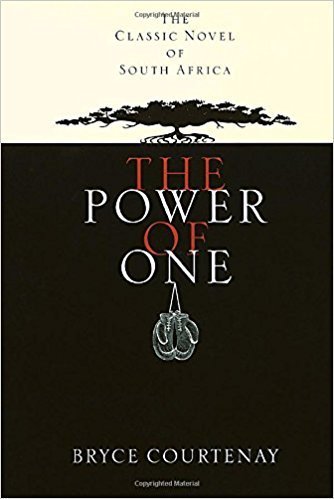
The Power of One - Bryce Courtenay
- Finished October 1st
As if I hadn’t read a depressing enough book with Blood Meridian, I decided to follow it up with this book. The Power of One takes place in South Africa in the late 1930s as you follow the life of a 5 year old boy. His mother is sent to an asylum and he is put into a boarding school. He is English, which are hated by the Boers, and the poor kid is tortured for the next hundred pages. It’s difficult to read about this poor kid being physically abused by bigger kids as well as the staff. The reader is rewarded throughout the rest of the book with a fascinating journey where the kid grows up with a mission to become the welterweight boxing champion of the world.
This book is very much an epic. It’s split into three sub-books, each focusing on 3-5 years of his life. The book ends around his 19th birthday and is filled with twists, turns, and a ‘chosen one’ storyline that the kid is aware of and has to deal with. It’s interesting to see the main character so self aware of a Jesus-like story line and his attempts to stop it while working toward his own personal goals. All in all this is a great read.
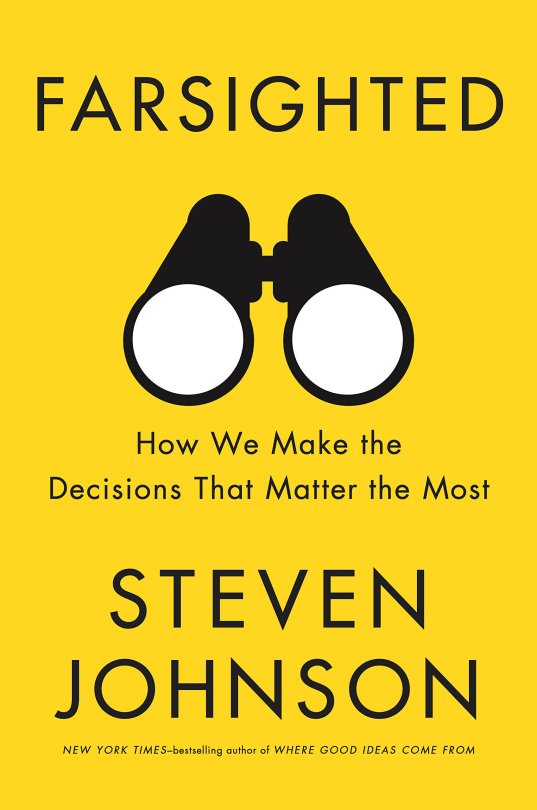
Farsighted - Steven Johnson
- Finished December 5th
Needing a break from all this fiction I decided to read Farsighted: How we make the decisions that matter the most. I was hoping this would be an examination into decision making, but it was more case studies of decisions that occurs mostly in New York. Going back into the 1700s, the author takes us through decisions from water supplies, historical battles, and real estate issues. I was hoping the book would be more prescriptive in how to make better decisions, but the author is just an author - not a researcher. All in all some interesting history but not what I was hoping for.
--
So it seems that I’m on average for about 7 books a year at this point. Hopefully I can step up the pace for 2019 as I’ve got a reading list as long as my arm at this point.
0 notes
Text
The 2017 Reading list
2017 marked my first year back into reading regularly. It’s been quite a while since I’ve had time to read but now that I’m commuting 2 hours a day on the train that’s definitely changed.
So without further ado, here’s the books I read this year with a short synopsis.

Principica Discordia * or * How I found Goddess And What I did To Her When I Found Her by Malaclypse The Younger
- Finished May 11th
An interesting collection of short letters, instructions, and dissertations that construct a manual on how to be part of a very disconnected religion of sorts. Heavily 60’s influenced and lots of nerdy jokes and plays on words. Has some interesting philosophical views, but nothing worth putting too much thought into.
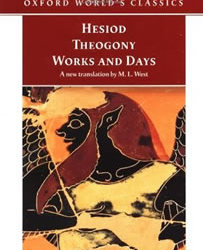
Theogony, Works and Days by Hesiod
- Finished May 24th
Translation and academic notes about Hesiod, one of the oldest known greek poets and two of his poems. Theogony details creation and gives us the parental structure of the gods. Works and Days is basically a Greek self-help poem about the best way to raise crops, fish, and be a good husband.
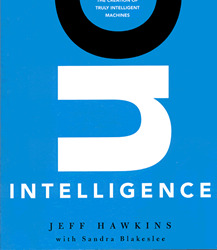
On Intelligence by Jeff Hawkins
- Finished June 14th
Jeff Hawkins created the Palm PDA and wrote a fascinating book about how the brain works and what intelligence actually is. There is a great amount of detail in how the cortex uses the sensory regions to recognize small patterns and pass those patterns as chunks higher up, so on and so forth. Apparently the Hippocampus sits atop the structure. It gets a little repetitive, but a great way to understand how a brain thinks and what intelligence and creativity is.

Atlas Shrugged by Ayn Rand
- Finished August 25th
Ayn Rand writes an epic tale involving dozens of characters and multiple industries. The book is tightly written around her economic principle of objectivism which she portrays in multiple ways attempting to show it in many different uses and lights. Unfortunately this makes the story pretty tedious as many characters will rail for pages and pages without pause in a preachy and awful manner. There’s quite a lot of good thought provoking ideas in objectivism, but by the end I was routing for all her champions to die. This book also does a good job of showing how awful society can be, especially when the least qualified gain the most control.
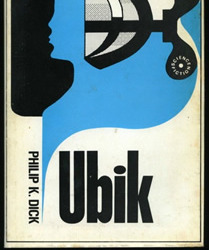
Ubik by Phillip K. Dick
- Finished October 29th
Philip K. Dick has an amazing ability to describe strange and difficult to comprehend worlds. In Ubik, which takes place in the way distant future of 1992 (making me feel old) the world is completely different. Death isn’t the end as people can be put into ‘half-life’ and can still commune with the living via a radio / telephone like device. The story is built around the idea of two competing companies, which are more than willing to kill the employees of each other as they deal in espionage / counter-espionage… but this is really just a back drop. The main characters almost immediately are put into a perilous situation that has you guessing if what they are experiencing is real, or if they all died and are in this ‘half-life’ state described immediately in the book. Once I finished the book, which ends with a head-scratcher ending, I diagramed and outlined the story proving that the book has too many contradictions for the reader to come up with a full understanding of what they just read. Enjoyable book, but useless due to the contradictions.

Utopia By Sir Thomas More
- Finished November 5th
Sir Thomas More outlines a society undiscovered by the Europeans, told from the point of view from a scholarly traveller named Raphael whom More meets as the story opens. From what I can gather, this was a common story telling device in the 1400s and was not meant to be deceptive. The Utopian society is described in exacting detail, from how they worship their religions to their rituals for war, death, education, and agriculture. It’s a very communal society with all of its cities built using the exact same template. Housing and education are paid for by the state, and everyone changes houses every 10 years. Gold is despised and worn by the slaves as punishment. It’s very strange and while entertaining, there is no way a society could run as described. I read this book because after finishing Atlas Shrugged I needed a point of view in direct contrast.
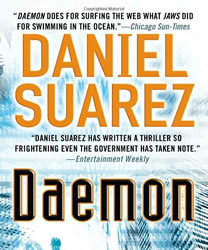
Daemon by Daniel Suarez
- Finished December 25th
My friend Marty gave me this book and its sequel a couple of years ago. I felt that I needed to read it to honor that gift. Daemon was written in the early 2000s and is a technological thriller, so that made reading it in 2017 feel somewhat dated, but still enjoyable. It’s fiction that would be in line with NCIS or some other television program for older Americans. Daemon begins with the death of a genius game developer who died in old age from cancer. A series of computer programs living on the internet have been scraping headlines for news of his death and sets in motion a series of killings, recruitments, and other extraordinary events to carry out the chaotic wishes of the dead game developer. Multiple government agencies and a few choices characters get wrapped up in trying to outwit and destroy the daemon. It crosses from science fiction to science fantasy about half way through, but it is still a fun read. Of course it’s a cliffhanger, so the sequel is next on my list.
---
So there we go. Only 7 books this year, but seeing that I started in April I think that’s pretty ok. Not to mention a couple of those books were over a thousand pages and I only get to read when I’m on the train.
0 notes
Text
Stumbling Upon Treasure... from The Black Hole!
This past summer my wife and I celebrated 10 years of marriage. We spent the majority of the time in her parent’s beach condo in Florida. This condo has a exercise room which also doubles as the community room. There’s books, and lots of VHS cassettes available for anyone to borrow. While exploring this room with my kids we find an overstuffed drawer that no one has opened in several years. What lay undiscovered in this drawer? TREASURE.

I should probably back up here a moment. Disney’s 1979 movie “The Black Hole” was my absolute favorite movie as a child. My father first brought home a VCR in the summer of 1985. I was 7 years old and he brought home “North by Northwest”, “Star Trek the Motion Picture”, and “The Black Hole”. I nearly wore out the tape.
So here I am staring at this metal cased limited edition release of The Black Hole and I’m over the moon. My kids didn’t quite understand why I was so excited, but they quickly started jumping up and down with me. I should also note here that I’ve read the ‘Random House’ book version of The Black Hole several times (more on that later), so they recognized it immediately.
So I find the building manager and ask him if I can give me $20 for it. He was very kind and told me that he didn’t need anything and I could keep it as a gift.
Ok, with all that out of the way: What’s in the box!?

Inside there are reproductions of the original 9 lobby cards, a 48 page collectors booklet with all sorts of goodness inside, and a digitally remastered widescreen print of the movie which includes the original theatrical trailer.

Dr. Reinhardt with one of his... slaves? (Not quite sure what to call those poor creatures) and Maximillian, the most awesome bad-guy robot ever.

Captain Holland, Vincent, and Old Bob. Another shot of Maximillian and the slave crew.

Dr. Durant, Mr. Booth, and Dr. Reinhardt next to Captain Holland going all fisticuffs with a sentry robot.

Our heroes trying to escape from a meteorite that’s bowling its way through the ship and a sentry droid going to heaven during a shoot-out.

There she is. The Cygnus. The most awesome ship science fiction has ever given us. (Sentimentally for me, anyway)
I could talk about this movie and its affects of me for hours. I’m haunted by the musical score, the amazing visuals, and the strangely poetic ending and super ambitious ending... but I’ll save all that for another time.
In the meantime I’ll leave you with this image of my The Black Hole story book and Vincent toy who is always watching over me on my desk.

0 notes
Text
Rediscovering HeroQuest
In 1991 I was 13 years old and discovered two games that pretty much set up what my adult life would become. Milton Bradley was working on a fantasy based line of games in a team-up with UK based ‘Games Workshop’. The output was two games: HeroQuest and Battle Masters. The moment I played these games I was hooked. I was definitely their target audience.
In this post I’ll share with you my adventures with the HeroQuest Game System. Milton Bradley had set out to create a board game version of Dungeons & Dragons with figures, cards, and a much easier or limited ruleset.

I’ve got quite a lot of games. I’m not a collector, but I definitely had a collection... if that makes any sense. The other day my 7 year old daughter was looking through my game room and asked about HeroQuest. I haven’t opened it in at least 20 years and haven’t played a full game in probably 25 years.
Seeing that this was my first free Saturday in quite a while I pulled it out and immediately discovered treasure! Before I get to that, let’s take a look at what’s in the box.

Under the lid I found the instruction booklet, the quest book, and the ‘evil sorcerer screen’ (as its called in the instructions)

The ‘Evil Sorcerer Screen’ has a lot of combat information and is used by the person playing in the role of Dungeon Master. In HeroQuest the Dungeon Master is ‘Zargon’, and evil sorcerer who is playing against the heroes. More about that later...

Underneath the game board we find all the figures, furniture, and cards for the game. The furniture had to originally be assembled. The instructions for that are printed on the underside of the box.



There are 4 heroes players can choose from. The Barbarian, The Dwarf, The Elf, or the Wizard. Each have their own character card and figure.


There are an assortment of spell, treasure, and artifact cards as well.

Finally, underneath all of that I find the real treasure that was lurking within. Several sheets of typed paper and hand-written maps. These were the quests I had made for the game when I was 13.

I remember spending night and weekends with my friends, coming up with ways to tie together both Battle Masters and Hero Quest into one epic campaign. We would talk about traps, level designs, and monster abilities for hours on end.
In early 1990 my father had brought home a Panasonic KX-R530 Electronic Typewriter. I had learned how to type at a young age and I pretty much wore this machine out. I probably would have if we hadn’t gotten a Packard Bell computer in late 1994.
Anyway, I typed out these quests and invented a universe for my friends to play in. There’s nothing too magical or original about these stories. At that point in my life I had read the hobbit and had watched Krull and Dragon Slayer dozens of times. But still, this is some of the earliest ‘Game Design’ and universe building I have a copy of. I’ve lost most of the work I produced before around the age of 20.
With that said, in the next post I’ll put up my ‘fan fiction’ expansion for HeroQuest. If any of you want to give the quest a run through, please let me know!
1 note
·
View note